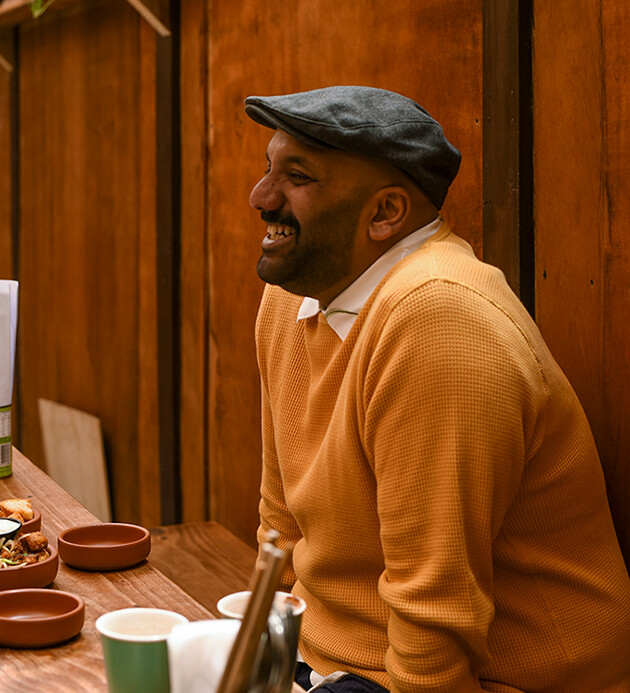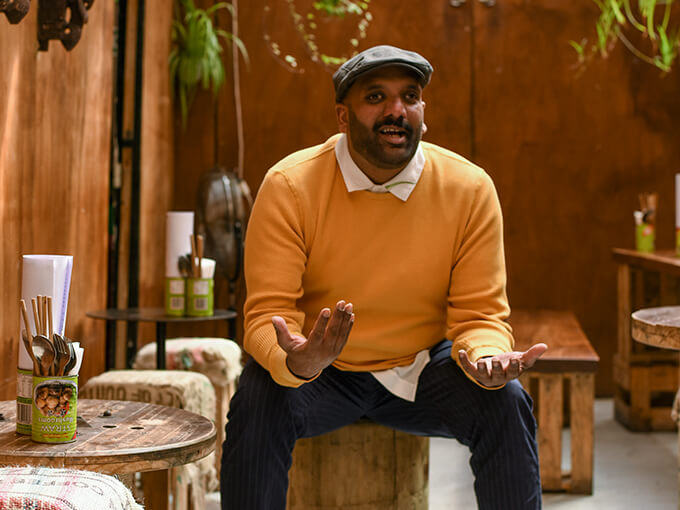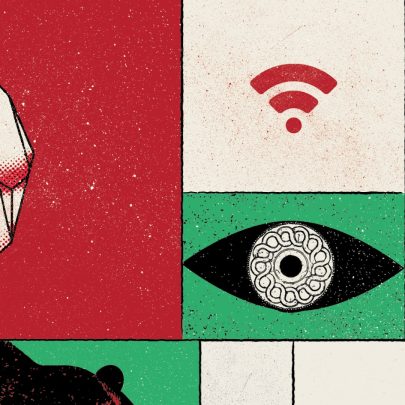Nov 19, 2019 People
Actor and theatre-maker Ahi Karunaharan was recently commissioned to write and direct My Heart Goes Thadak Thadak. Metro writer Jean Teng talks to him about Auckland’s theatre scene, giving back, and what he eats at Satya Chai Lounge .
Ahi Karunaharan’s regular Satya Chai Lounge order is a round of curryflower, idli fry, chilli chicken and masala fries. I meet him at their original branch in Sandringham, where he lives and draws inspiration for his work. “It feeds me, literally, this place,” he says. “All my major works have started off right here.”
Karunaharan, 39, is animated: his words fly fast, in unison with his hands. He is immediately likeable, especially as he opens our conversation with a very relatable confession. “Every decade, I get to this point where I’m like, what do I do with my life? And it always happens in the nines. I remember in 2009 [in Wellington] going, ‘Oh, I need to move to Auckland, that’s where art’s happening.’ And now I’m in the same place again, in 2019.”
But those inner crises seem to be productive. Karunaharan — a theatre-maker and actor — has an impressive CV. Since graduating from Wellington’s Toi Whakaari, he has worked with multiple theatre companies; acted in theatre and on screen; founded a production company, Agaram Productions; mentored young artists from Proudly Asian Theatre’s Fresh Off the Page series and the Film Commission’s New Asian Writers initiative; and won an overall production excellence award at the Auckland Theatre Awards for his 2018 Auckland Arts Festival play, Tea. All this and he tells me, “I still consider myself emerging.”

Karunaharan was recently commissioned by Silo Theatre to write My Heart Goes Thadak Thadak, a play set in 1970s Bombay: after a legendary Bollywood director dies in the middle of shooting his latest film, an epic desi Western, his two children have to take up the mantle. It’s a collision of East and West, a way of exploring questions around representation, modernity and tradition, but told in a spirited, interactive way, full of divas and dancing and immersive joy. It’s a return to what Karunaharan loved as a child, and a South Asian reimagining of a typically white genre. After tackling “loss and genocide” in earlier works, he says, “I just wanted to do something fun and playful. Thadak Thadak is an end-of-year, whanau Christmas, take-your-mates kind of show.”
Karunaharan is Sri Lankan (Tamil/Sinhalese), but born in the UK. His family moved to Wellington in 1990. Much of his work has explored Sri Lankan history — Tea spans from the tea estates of the 1800s to the distant future, and his acclaimed solo show The Mourning After is about life in Sri Lanka after the 2004 Boxing Day tsunami.
Sri Lanka was embroiled in civil war for more than 25 years, and Karunaharan feels a responsibility to document and rebuild a lost history. “My community was silenced for speaking a language. Our literature was burnt, our libraries were burnt down.”
Although Karunaharan trained as an actor, he’s grown the most in writing, directing and production. That was born out of a need to step up in an industry with few, if any, South Asian directors, to rewrite the narrative for himself and other South Asians.
“My initial burden was to my community, this burden to tell everyone’s stories, and I can’t,” he says. “This thing I keep saying: we have so little airtime, so little stage time, that when you write issue-based theatre, it’s like you’re putting your community’s dirty laundry up in the air.”
He doesn’t still feel that way. There’s a bit of his community in everything he does. “Our communities have always been making works — like, every weekend, there’s a community show that’s happening, and I’m just trying to bring us out from the fringes.”
He doesn’t allow all the heaviness to weigh him down, though; he calls himself an eternal optimist. A little of that is for survival. “I’ve seen a lot of my friends who have fought hard and have become so cynical in the system. As an Asian practitioner, when I look at tangata whenua, and I go, ‘There’s no home for a national Maori theatre company’, then where do I sit within that context as well? That’s the big question, because you can tell how an industry is supported by the way they look after their indigenous people.”
But, he says, you’ve got to focus on the light. “In the theatre, we bring the lights up to tell a story. It’s about working towards that light.”
Giving back is crucial. “I think for me, my practice right now is to be the person I needed when I came out of drama school.” No wonder he’s so involved with mentorship and upskilling. His production company created First World Problems and its sequel, in which more than 20 South Asian artists performed a montage of works to form an anthology of voices. “How can I activate and create more writers and directors so that as an actor, I can get work as well?” He laughs. “I think it’s important for those who’ve had support to be helping others who are trying to come up. You can’t occupy that space alone.” It’s important to cultivate an environment where you’re not merely the singular voice, but one of many. He learnt from working with indigenous theatre companies around the world — including Maori and Kuki ’Airani (Cook Islands Maori) creative company Tawata Productions — that supporting artists right from the grassroots is vital.
For the future? The next frontier would be screen, Karunaharan says. Specifically film. New Zealand has never seen a Sri Lankan film director. We haven’t seen any English-language Sri Lankan films. And that feels like a problem.
My Heart Goes Thadak Thadak plays at Q Theatre from 21 November to 14 December.
This piece originally appeared in the November-December 2019 issue of Metro magazine, with the headline “Towards the light”.






